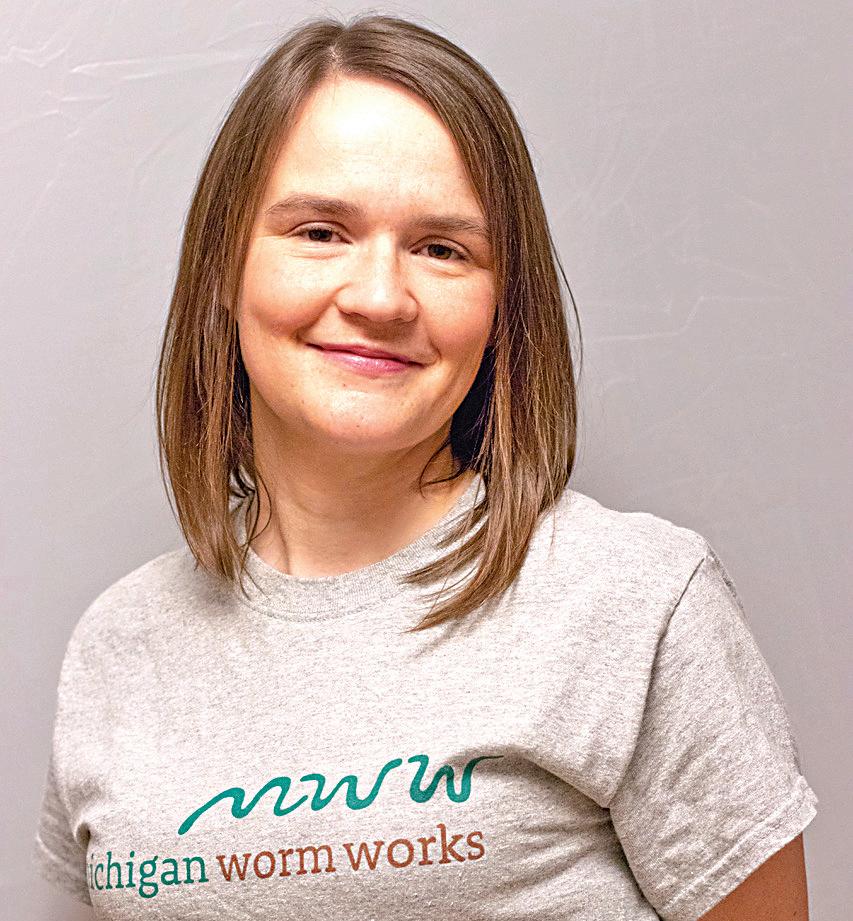
10 minute read
features
SAVED FROM DESPAIR BY WORMS
A Manistee mom turned a miniature effort to combat climate change into a thriving business.
By Patrick Sullivan
A couple of years ago, with another child on the way, Elana Warsen said she had a sort of miniature existential crisis — she wanted to do something to make the world a better place, but she wasn’t sure what to do.
Warsen, who lives with her husband and three children in Manistee, found the answer under her feet, in the ground. She decided to broaden her family’s composting regime by composting indoors with worms, a technique that can be used throughout the worst winters without having to go outside to turn a compost heap.
Her foray into the world of worms has taken over a large chunk of Warsen’s life. She’s turned her passion for them into a business called Michigan Worm Works, and she wants to spread the word about how worms can turn food waste into a valuable commodity.
Northern Express recently chatted with Warsen about her passion. This interview has been edited and condensed for clarity.
Northern Express: Tell me about how you got interested in worms. about the environment. And then during a time in my life when I had really little kids, and I was pregnant with a new child, I just felt this overwhelming urge to do something, whatever I could do to make the world a safer place for my children. I felt I had little control over these big problems, and it was causing stress and anxiety, and I didn’t want to feel that way anymore. So, I channeled that energy into a project, and that project was going to be finding a way to continue composting our household food scraps during the winter.
Express: That’s a really interesting way to put it. I think you take something like, say, the climate crisis, and as individuals, we feel helpless, like maybe it’s easier to give up because there’s nothing we can do on our own. But then, if you do find something meaningful that you can actually do, it makes a difference, doesn’t it?
Warsen: Yeah. Yeah. And it wasn’t meaningful in the beginning. Right now, we’re a family of five, and, you know, even us diverting our food waste like that doesn’t change the world. But it really changed me to feeling like I have the agency to live my life with a purpose instead of a feeling of despair. seem like something that you thought might become a business? Or did that come later?
Warsen: No, no, no. That definitely came later. It didn’t feel like something that was going to be a business. It felt like, ‘I’m really glad that my husband is humoring my pregnant self, keeping a bucket of worms in our basement.’ And, you know, it just felt like an experiment or something. Just something I wanted to do, I wanted to try.
Express: How did it grow to become a business then?
Warsen: Because I kept acquiring more and more worm stuff. I started with the one bucket, and then I built another bucket. I built some worm habitats out of buckets, and those were fine in the basement. And then I decided I wanted to upgrade to something bigger, larger-scale, more user-friendly. And my husband said, ‘OK, that’s fine’ — and he’s not my boss or anything, but, you know, if something’s going to become part of your shared living space, you want everyone on board. My husband said, ‘You know, Elana, if you want to take up all of our garage space and some of our living space, that would be OK — if you could make some money doing it. If it’s not making us any money, then we have to keep it to a reasonable size.’ And that seemed fair. And so, I put an ad on Craigslist: ‘worm castings for sale.’ And, my husband and I were both pretty surprised. I got a lot of people interested in buying them.

Warsen: They don’t. Well, there is an odor. It’s like an earthy smell. If your worm habitat is healthy, if you’re managing it properly, it just smells when you lift the lid. It smells like a pile of leaves or like you’re in your garden. I want to say it’s like composting, with worms in the mix, but it’s a different process than that. Most people are familiar with thermophilic composting, a hot compost pile that you’ve got to get cooking. You know what I mean? You add the carbon and nitrogen, and then it gets really hot, and it breaks down. This [with worms] is called philic composting, where the microorganisms in this environment prefer room temperature, not hot. So, it never starts cooking. It just stays at room temperature. Microorganisms accumulate on the compostable material that you add. And then the worms devour those microorganisms. And that’s why it works indoors and during the winter, unlike the other kind.

Express: Are the two kinds of composting otherwise the same? I mean, can you put the same kind of things in each of them?
Warsen: How do I want to put this? It’s all a matter of scale. So, if you can imagine, like, a glass of water, and you drip some hot sauce into it, then that’s going to be noticeable and overwhelming. If you have a fish tank or an aquarium, and you drop some hot sauce into it, that’s going to be imperceptible. So, if you add a whole bunch of onion in there, that might be too acidic for the worms. I would throw an onion in my backyard regular compost pile, no problem, without a second thought. If I’m feeding it to my worms, I kind of like to think of them. I think, would I want this in my eyeball? If I wouldn’t want it in my eyeball, I’m not going to give it to the worms. So, I just I tend to put more neutral food scraps in there. Then I reserve those more acidic, pungent things for the regular outside pile.
Express: How do people get started with worms?

Warsen: If you want to compost with worms at home, you need a bin — a habitat for them to live in — and that can be as simple as a five-gallon bucket or a plastic tub. And you drill some holes in the top and around the top of the sides for aeration and holes in the bottom for drainage. There shouldn’t be very much liquid that would come out, but you need that as an escape for the liquid if anything goes awry. And you fill this container with shredded newspaper or shredded cardboard. You can shred it with your hands. You want it to be damp so you would moisten in that paper and then wring it out so it’s like the consistency of a damp sponge that’s been wrung out. And you fill that three-quarters of the way full.
And then you add worms. And you start by feeding them a little bit of food scraps at a time, just a small amount. Over time, you’ll notice that the worms are getting to that small amount of food more and more quickly, and you can begin adding more at a time and more frequently. And then the worms do their thing. They poop. You can harvest the poop and use that in your garden. Eventually, it just looks like compost.
Express: So, you’re raising three young children and now you’re also running a growing business. Tell me what that entails.
Warsen: I’ve got my worms in my laundry room and where they reproduce prolifically and eat our food scraps and turn them into worm castings, which is technically known as a soil amendment. You can use it basically anyplace you would use fertilizer, but it’s not classed as a fertilizer. It’s technically classed as a ‘soil amendment.” The business involves selling that, the compost, the worm manure, to gardeners and farmers and all kinds of growers. It’s safe for your — whatever you grow; it’s safe for your health, the health of your body. And it’s good for the environment, also because it reduces the demand for petroleum-based fertilizers; those fertilizers don’t have microorganisms that build the soil ecosystem, either. This [worm castings] builds a healthy soil that doesn’t need to be replaced over and over again. You don’t need to add more and more and more inputs. All those microorganisms are going to become part of the living soil.



Express: You also sell worms, don’t you?
Warsen: I sell worms to people who want to get started doing this themselves. But if people want to use them for bait or something, then I suppose they could do that. But so far, everybody who has bought worms for me has been interested in doing this on their own. Like you know, at first, when I thought it was so cool and I told my mom, she agreed to try it out of sympathy for me or something, and now she’s hooked. The same thing with my brother and sisterin-law.
Express: The people who buy compost from you, what are they growing?
Warsen: I do find that there’s a couple of different general categories of people who are interested in my business, who want to become customers. And those are people who are concerned about the environment and want to manage their food waste responsibly and want to use ecologically friendly soil amendments. And then there’s also people who are serious growers who want the worm castings, the compost, because it’s a really, really potent soil amendment. It has lots of nutrients in it. A lot of cannabis growers use it. A lot of people who grow vegetables indoors in the winter. People put it on the community garden here in Manistee. I’ve had some customers add it to their raised garden beds. People grow all kinds of edible plans. You can use it on your houseplants, too.
Express: Do you have other pets, or is it just the worms?
Warsen: No. We don’t have other pets. I was going to say, though, that for anybody with little kids, the reason we don’t have pets is because, with little kids in the house, it’s enough already around here. We don’t want to deal with the extra mess, extra damage to the furniture. We don’t want to deal with the emotional perils of an animal that gets sick or lost or runs away or passes away. We didn’t want anything fragile. We’ve got a six-year-old, a three-year-old, and an 18-month-old — and the worms, they don’t run away. If you drop them, they don’t get hurt. If you squish them, nobody notices or cares. They can’t bite you. You hold them in your hand, and it’s mesmerizing and the kids observe them. And they say, ‘I noticed that,’ ‘I figured out how they move,’ or ‘I think I figured out which end is the front end.’
To find Elana Warsen and order compost or kits to get started composting with worms, look up Michigan Worm Works on Facebook.
FRANKFORT
Furniture, Fiber, Photography, and Sculpture Exhibition runs January 22 - February 19 Open 6 Days | Free Admission | South End of 2nd Street Frankfort, MI | oliverart.org | 231-352-4151
When it’s finally time to ...
DOWNSIZE BUY YOUR DREAM HOME
OR FIND THE PERFECT VACATION HOME
Jennifer Gaston will guide you through the process as your trusted advocate. Be the priority and call Jennifer today!





